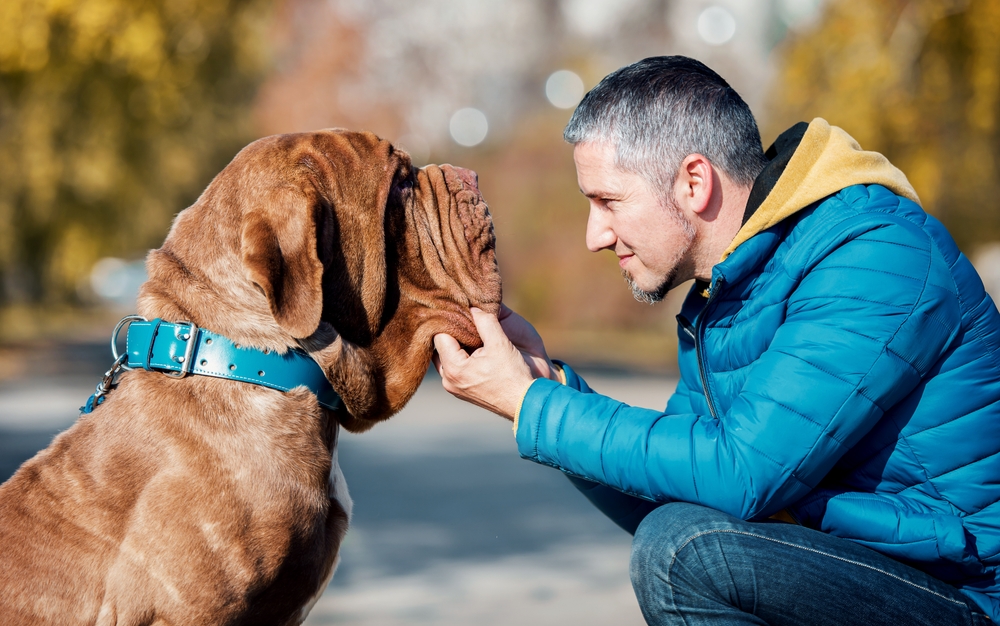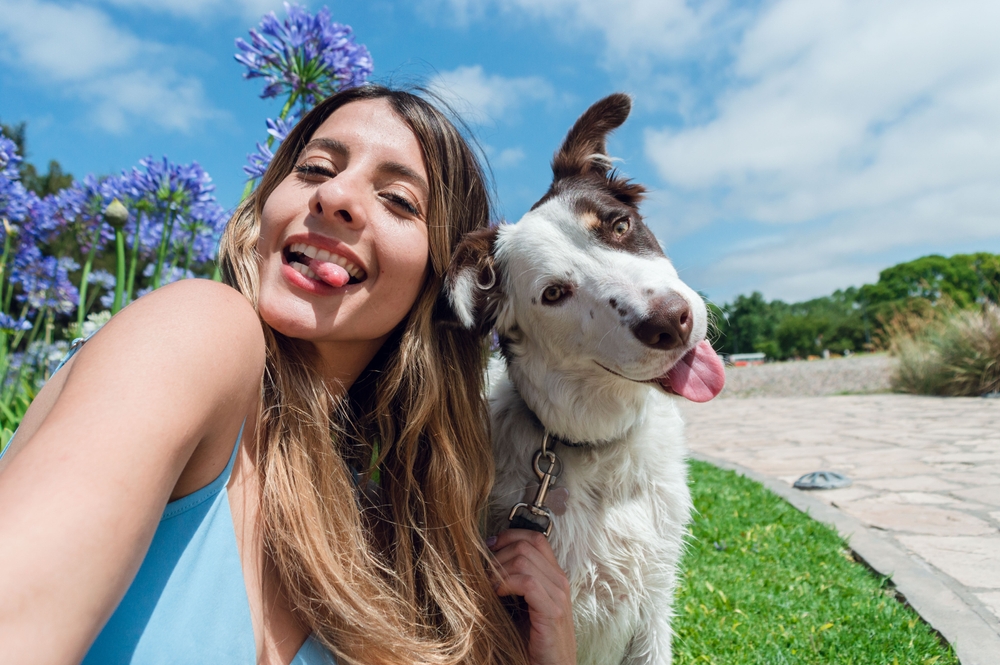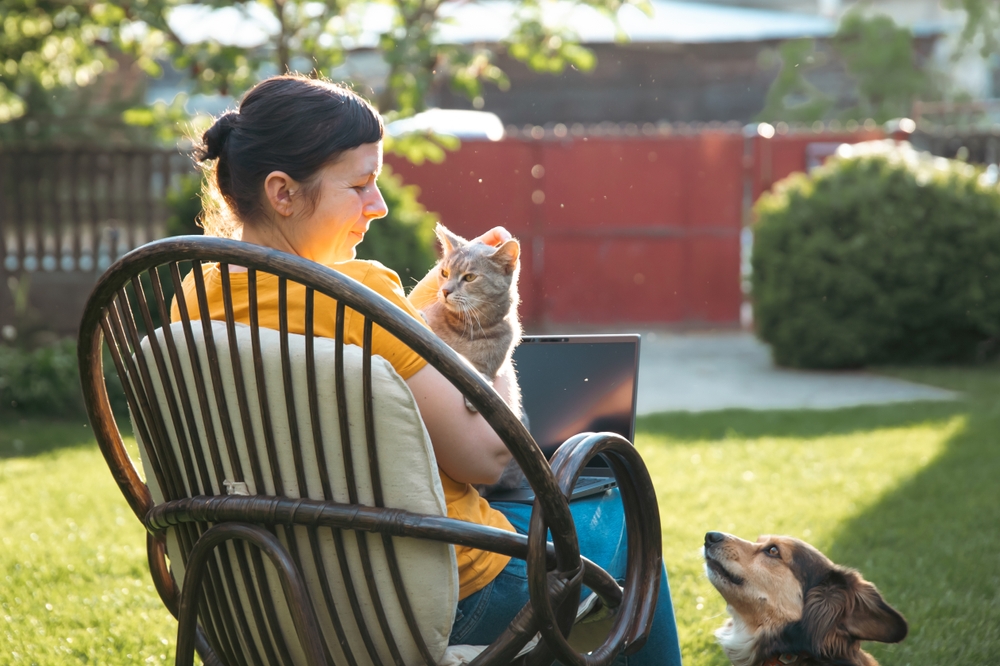Dogs have been our loyal companions for millennia, yet their understanding of us often feels intuitive beyond explanation. They possess an uncanny ability to perceive our moods and intentions, often before we’re even aware of them ourselves.
1. Our Tone of Voice

Dogs have an exceptional ability to detect subtle changes in the tone of your voice. This skill isn’t just about gauging whether you’re happy or angry; it’s about deciphering the nuances that lie within your vocal inflections. Research from the University of Sussex found that dogs can differentiate between distinct tones and pitches, allowing them to respond appropriately to your emotional states. So, even if your words are saying one thing, your tone could be conveying something else entirely, and your dog is keenly aware of it.
This understanding goes far beyond simple obedience commands. It’s about picking up on the subtler cues that indicate stress, excitement, or sadness. Dogs, through years of domestication, have honed this skill as a survival mechanism to maintain harmony with their human family. This is why your pup seems to know when you need comfort before you even recognize it yourself.
2. Our Daily Routine

Dogs thrive on routine and have an impressive knack for recognizing your daily patterns. They know when it’s time for a walk or when dinner is supposed to be served. This understanding of routine extends to your activities, even without a clock in sight. Dogs have an internal sense of time, keeping track of when you usually come and go, and they rely on these patterns to feel secure.
While you might not notice the clockwork nature of your schedule, your dog certainly does. It’s why they’re often at the door just as you’re about to grab the leash, or why they seem to hover near the kitchen around dinner. This ability to predict your actions based on routine helps them anticipate needs and adapt to changes inthe environment or lifestyle. The dog’s understanding of these rhythms contrasts with our often oblivious attitude toward our daily habits.
3. Our Fluctuating Emotions

Dogs are masters at reading the emotional undercurrents that flow through your everyday interactions. They possess an innate ability to sense when something is off, often providing comfort without being asked. A study published in Learning & Behavior demonstrated that dogs can detect human emotions through subtle cues like facial expressions and body language. This allows them to respond in ways that are surprisingly appropriate, whether by offering a nuzzle or simply sitting quietly by your side.
This emotional intelligence is not just about reacting to overt displays of emotion. Dogs can pick up on the stress you might not even be consciously aware of, mirroring your mood in their own demeanor. This understanding is what makes the bond with a dog so fulfilling. They offer a form of empathy that is uncomplicated, genuine, and without judgment, often leading to moments of introspection about our own emotional states.
4. Our Powerful Presence

Your dog understands the power of presence, knowing that sometimes just being there is enough. Unlike humans, who may feel the need to fill silence with words or actions, dogs often instinctively grasp when a quiet presence is what’s most needed. Their ability to sit beside you in silence, offering companionship without demanding anything in return, speaks to a deep understanding of the healing nature of presence.
This awareness is particularly evident in times of distress or sadness. Dogs often position themselves physically close to you, offering a silent form of support. They seem to know that their presence alone can provide solace and comfort, a lesson in mindfulness and being present in the moment. Through their quiet companionship, dogs teach us that sometimes words are unnecessary.
5. Our Unique Smell

A dog’s sense of smell is nothing short of extraordinary, and this translates into a deep understanding of who you are. Dogs can detect changes in your scent that might indicate a shift in your health or mood. Research from the University of Liverpool has shown that dogs can identify specific human diseases through scent alone. This olfactory sensitivity allows them to pick up on nuances that are imperceptible to humans.
This goes beyond merely recognizing your scent to understanding the cues it provides. Dogs can detect hormonal changes, such as those caused by stress or illness, allowing them to respond in ways that are often surprising. This skill not only highlights their incredible sensory abilities but also their desire to protect and care for you. Your scent is part of their world, and they use it to navigate their relationship with you.
6. Our Body Language

Dogs are adept at reading human body language, often picking up on cues that go unnoticed by other people. They observe the way you move, the gestures you make, and the tension in your muscles, all of which provide a wealth of information. This ability to interpret body language is a key component of their communication skills, helping them to anticipate your needs and respond accordingly.
This skill is more than just recognizing when you’re about to reach for their leash; it involves a deeper comprehension of your physical state and intentions. Dogs can sense when you’re feeling tense or relaxed, and they adjust their behavior to match your mood. This instinctive understanding of non-verbal cues allows them to connect with you on a level that often transcends spoken language. It’s a reminder of the power of silent communication and the subtle ways we interact with the world around us.
7. Our Social Dynamics

Dogs are keen observers of social dynamics and can often pick up on the relationships you have with others. They understand the subtleties of social interactions, such as who you favor or who might make you uneasy. A study in Animal Cognition found that dogs can differentiate between helpful and unhelpful people, often adjusting their behavior based on these assessments. This understanding allows them to navigate complex social environments deftly.
This ability to read social cues extends to recognizing when tension or conflict arises. Dogs might position themselves between you and a perceived threat or offer comfort when you’re around someone they sense you dislike. Their understanding of social nuance is rooted in their pack mentality, which values harmony and peacemaking. In observing these dynamics, dogs remind us of the importance of social bonds and the roles we play within our communities.
8. Our Attention Span

Dogs understand the concept of attention in a way that is both intuitive and profound. They are perceptive to when you’re truly present and when your mind is elsewhere. Dogs often seek out eye contact, understanding it as a form of communication that signals engagement and connection. This awareness of attention helps them determine when you are available for play, affection, or when you need space.
This understanding is evident in how they react to your focus or lack thereof. A dog may nudge your hand or bring you a toy when they sense your attention drifting. In seeking your attention, they highlight the importance of being present and mindful in interactions. Through this, dogs teach us the value of genuine engagement, urging us to be more attuned to the moments we share with others.
9. Our Comfort Zone

Routine offers comfort, and dogs know this better than anyone. They understand the importance of predictable patterns and how these routines create a sense of security. Dogs often anticipate regular events, like mealtime or walks, with excitement because these routines affirm their place in your life. This appreciation for routine underscores a fundamental need for stability that dogs recognize and cherish.
For dogs, routines aren’t just about regularity; they are a form of communication and connection. By participating in these daily rituals, dogs feel a sense of belonging and purpose. They remind you of the grounding power of routine, encouraging you to embrace the everyday moments that might otherwise go unnoticed. In this way, dogs show us that predictability can be both comforting and connecting.
10. Our Empathetic Nature

Empathy is a trait that dogs possess in abundance, often offering emotional support without uttering a word. They have a remarkable ability to sense when you’re upset or stressed and respond with comfort and care. Unlike humans, who might struggle to find the right words to offer support, dogs simply offer their presence and affection. This silent empathy is profound, creating a connection that transcends verbal communication.
This empathetic nature is what makes dogs such effective emotional companions. They provide a sense of understanding and acceptance, offering a balm for emotional wounds. Dogs don’t need words to empathize; they inherently know when their humans are in need and step in to provide solace. Their ability to offer this kind of support teaches us about the power of empathy, reminding us that sometimes presence and patience are the greatest gifts we can offer.
11. Our Unconditional Love

Dogs understand love in its purest form, providing it unconditionally without expectation or demand. They don’t care about your flaws or mistakes; their affection remains steadfast regardless of circumstances. This unconditional love is a cornerstone of the human-dog bond, providing a model for how we might strive to love others. Dogs teach us that love doesn’t need to be earned—it’s given freely and abundantly.
This kind of love is rare and precious, serving as a constant reminder of the power of acceptance. Dogs don’t judge or hold grudges; they forgive and move forward with boundless enthusiasm. Their love is a testament to the bonds formed through trust and companionship, reminding us to cherish and nurture our relationships with the same devotion. Through their unwavering love, dogs show us how to embrace compassion in its truest form.
12. Our Simple Pleasures

Dogs embody the joy of simplicity, finding happiness in the most mundane of activities. Whether it’s a simple walk, a game of fetch, or a nap in the sun, dogs find delight in the everyday. This appreciation for the simple things in life is a lesson in mindfulness, encouraging us to slow down and savor the present moment. Dogs remind us that fulfillment doesn’t come from complexity, but from appreciating what’s right in front of us.
This approach to life is both refreshing and inspiring, urging us to find joy in the little things. Dogs don’t need extravagant toys or elaborate experiences to be happy; their contentment comes from being with you. Their ability to find happiness in simplicity is a powerful reminder of the richness found in everyday life. In a world that often demands more, dogs teach us the beauty of less.
13. Our Need for Rest

Dogs understand the value of rest, often taking the time to recharge without guilt or hesitation. They nap frequently and sleep deeply, recognizing that rest is an essential component of well-being. This natural inclination towards restfulness is something we could all learn from, as it underscores the importance of balance. In a world that glorifies busyness, dogs remind us that rest is not only beneficial but necessary.
This appreciation for rest extends beyond physical health; it’s about mental rejuvenation as well. Dogs show us that taking a moment to pause and recharge can lead to increased happiness and productivity. They don’t rush through life, but instead take the time to enjoy each moment fully. By following their lead, we can learn to prioritize rest and find a healthier rhythm in our own lives.
14. Our Hidden Love of Play

Play is an essential part of a dog’s life, and they understand its significance in fostering joy and connection. Dogs approach play with enthusiasm and creativity, finding endless ways to engage in fun and imaginative activities. This love of play is infectious, encouraging us to let go of our inhibitions and embrace our playful side. Dogs remind us that play isn’t just for children—it’s a vital part of life that keeps us young at heart.
This playful spirit is more than just entertainment; it’s a way to connect and bond with others. Through play, dogs strengthen their relationships, build trust, and explore the world around them. Their ability to find joy in play teaches us the importance of laughter and lightheartedness in our lives. In a world that often takes itself too seriously, dogs show us the transformative power of play.
15. Our Unwavering Loyalty

Loyalty is a defining characteristic of dogs, and their unwavering devotion is one of their most admirable traits. Dogs remain by your side through thick and thin, proving that loyalty is not just a word but an action. This steadfast commitment is a testament to the deep bonds formed between humans and dogs, highlighting the importance of trust and fidelity. Dogs teach us that loyalty is about standing by those we care about, no matter the circumstances.
This loyalty extends beyond mere presence; it’s about emotional support and companionship. Dogs show us that loyalty is about being there for one another, offering comfort and understanding in times of need. Their devotion is a reminder of the strength found in relationships built on trust and respect. In a world where loyalties are often tested, dogs exemplify the true meaning of the word, inspiring us to be better friends and companions.
